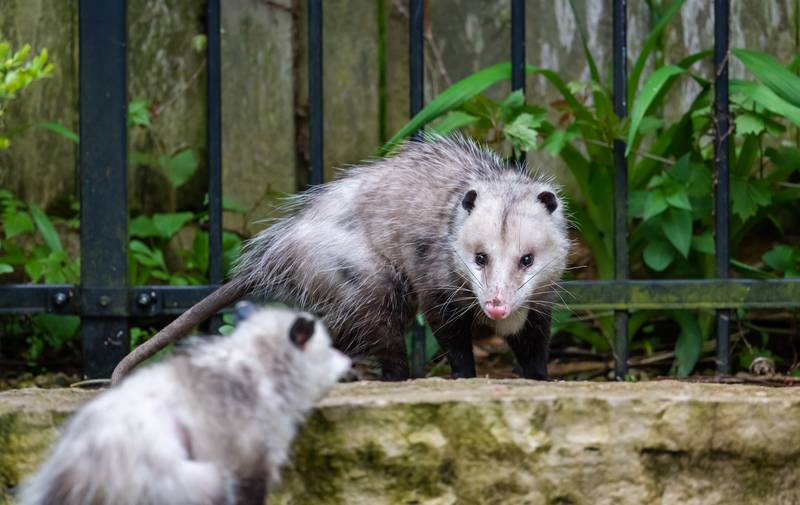How to Stop Dog Barking at Possums (+ Why They Hate Them!)
Is your dog barking at possums every night and you’re not sure how to stop it? Don’t worry, this article is here to help. We’ll discuss everything you need to know about why dogs bark at possums and how you can help them end this behavior.
We’re going to explain why dogs hate possums (or at least seem to) and what you can do when this barking happens during the night. If you’re worried that possums are dangerous to dogs, we’re going to cover that too (including answering if possum poop is toxic to dogs). So if your dog keeps stop barking at possums, continue reading below!
How to Stop Dog Barking at Possums

To stop dog barking at possums:
- Teach your dog the “quiet” command to use whenever they bark at possums or at any other time you need them to become silent.
- Practice by bringing your dog to a place you know they’re going to bark (the park, etc) with plenty of treats.
- As soon as your dog begins to bark, say “quiet” in a calm, positive voice. If they respond and get silent while also paying attention to you immediately reward them with praise and a treat.
- But if your dog keeps barking or quickly starts again, then hide a small treat in the palm of your hand.
- Place your hand right by your dog’s nose. They’ll still be able to pick up the scent even within your hand and will quit barking to sniff it.
- As soon as they’ve stopped barking and are paying you all their attention, again say “quiet,” and then open your hand to give them praise and a small treat.
- If they keep being silent and are giving you their attention, continue rewarding them with praise and treats.
- But if they again begin to bark or are not paying attention, repeat the process of hiding a treat within your fist, placing it close to their nose, and waiting until they quit their barking and pay attention.
- Always be sure to wait until they’ve quit barking and are giving you all their focus, and then say “quiet” before you reward them with any treats or praise.
- This forms a positive connection for your dog with the “quiet” command, and with staying quiet and focusing on you.
- With repetition, consistency, and patience, you will be able to get them to behave with only the “quiet” command, and it won’t be necessary anymore to put your fist by their mouth.
- When your dog is responding well with only the command, then you can begin increasing the amount of time you wait before you reward them.
- Start by pausing for about 2 seconds, then as they do well move that up to about 5 seconds, and so on.
- Soon, you’ll no longer need to reward your dog with food and praise, and they will become silent and pay attention to you solely by you giving the command.
These steps will get your dog to stop barking at possums, but it’s important to remember that the underlying behavioral issues (anxiety, territorial dominance, etc.) that were causing all of this to begin with will still be present. And until you address those, any positive changes you see are only going to be temporary.
“Okay, so how do I make them last then?”
By getting your dog to truly choose to follow your direction, that’s how. I tried many times to write out how you can do that before deciding it made more sense to just link you to the free video series that explains it better than I’d ever be able to.
The series is by a man named Dan who is one of the world’s leading dog obedience trainers. In it, he teaches you how to put an end to things like when your dog barks at possums and all other misbehavior using his fast and easy-to-follow methods.
In the first video, Dan will reveal to you why the two most common methods of dog training only doom you to failure. You can watch the video now by clicking here. Follow the proven system he’ll show you in his series and you’ll never have to spend another second worrying about your dog barking at possums ever again!
Why Do Dogs Hate Possums?

Dogs don’t inherently hate possums, but their reactions toward possums stem from their natural instincts as predators and protectors. Dogs may see possums as potential threats or prey due to the possum’s nocturnal nature and unusual appearance.
Predator Instincts
Dogs are descendants of wolves and have retained some of their predatory instincts. A dog’s prey drive can trigger an aggressive response when they encounter small animals, including possums. Their movement, especially a fast or sudden one, can stimulate this prey drive and cause dogs to chase or even attack and kill a possum.
Protection of Territory
Dogs are naturally territorial animals. If a possum wanders into a dog’s perceived territory, such as a backyard, the dog may react aggressively to defend its home. This response isn’t due to a specific hatred for possums but is a general reaction to any unfamiliar animal encroaching on their territory.
Nocturnal Intruders
Possums are nocturnal animals, meaning they’re most active during the night. This nocturnal activity can seem suspicious to dogs, leading to heightened alertness and potential aggression. The mystery and unpredictability of an animal scurrying about in the dark can put dogs on edge, creating a negative association with possums.
Unfamiliar Appearances
The unusual appearance of possums, with their long tails, sharp teeth, and hissing noises, can be intimidating or unsettling to dogs. Dogs rely on their senses to interpret their environment, and the unfamiliar sights, sounds, and smells of a possum can create a sense of unease or hostility.
In conclusion, dogs’ apparent dislike of possums is more a reaction to their instincts and the unfamiliar characteristics of possums than an inherent hatred. Understanding this can help in managing their behavior towards possums and other wildlife. Make sure you’ve also taught your dog the “quiet” command, which we explained in the first section.
Dog Barking at Possums at Night
Dogs barking at possums at night is a common occurrence as possums are nocturnal animals and dogs have keen senses to detect their presence. This barking can be managed through training, keeping your yard clean, and creating barriers.
Let’s delve deeper into these solutions:
- Training: You can train your dog to stop barking at possums by using commands like “quiet” (view step-by-step instructions in the first section). Positive reinforcement works well here. Reward your dog when they stop barking on command. This might take time and patience, but with consistency, your dog can learn to stop barking at possums.
- Yard Maintenance: Possums are attracted to food sources. Make sure to secure your trash cans, clean up any fallen fruits or pet food left outside. A clean yard is less attractive to possums and reduces the chances of your dog encountering one.
- Barriers: Creating a barrier like a fence can help keep possums out of your yard. You can also trim trees that possums might be using to get into your yard. There are also possum deterrents available on the market that you could consider.
- Indoor Time: Since possums are active at night, consider having your dog indoors during those times. This will minimize the chances of your dog encountering a possum and barking at it.
With these measures, you can effectively manage your dog’s barking at possums during the night, ensuring a peaceful environment for you and your pet. Address things now or the behavior will spread and get worse. You may soon find your dog attacking raccoons, killing armadillos, barking at badgers, barking at foxes, or barking at skunks.
Are Possums Dangerous to Dogs?
Possums are not dangerous to dogs generally. They are non-aggressive animals that prefer to avoid confrontation. However, if cornered or threatened, they can bite in self-defense, potentially transmitting diseases like leptospirosis or parasites such as ticks and fleas.
Possums and Disease Transmission
One concern when dogs interact with possums is the potential transmission of diseases. Possums can carry leptospirosis, a bacterial disease that can affect dogs and humans. They can also carry fleas and ticks that may carry Lyme disease. However, the risk of transmission is relatively low, as possums themselves are notably resistant to many common diseases.
Defensive Biting
Possums are typically non-aggressive and will opt to “play dead” or escape when threatened. However, if they are cornered and feel they have no other option, they can bite in self-defense. Although possum bites are rare, they can cause injury and possible infection if not treated properly.
Parasites
Possums are known to carry external parasites such as ticks and fleas, which can be transferred to dogs. While this doesn’t pose a significant danger in itself, these parasites can carry diseases that could affect your pet. Regular flea and tick control measures for your dog can help mitigate this risk.
Aggressive Encounters
While possums aren’t inherently dangerous to dogs, interactions between the two can become hazardous if they escalate into a fight. Dogs can injure possums, which might provoke a defensive response, leading to potential harm on both sides.
In conclusion, possums aren’t typically dangerous to dogs, but certain situations can pose a risk. It’s best to prevent interactions between your dog and possums to avoid any potential danger or disease transmission. Learn more about handling their behavior in the first section.
Is Possum Poop Toxic to Dogs?
Possum poop can be harmful to dogs as it might contain harmful bacteria, parasites, and pathogens that can cause diseases. If your dog eats possum poop, they might experience symptoms like vomiting, diarrhea, loss of appetite, or other signs of illness.
Here are more details about these risks:
- Bacterial Infections: The feces of possums may contain harmful bacteria like Salmonella or E. coli. These bacteria can cause gastrointestinal issues in dogs, leading to symptoms such as vomiting, diarrhea, and loss of appetite. In severe cases, these infections can cause serious complications and might require veterinary treatment.
- Parasites: Possum poop could harbor parasites like worms or protozoa. When your dog comes into contact with or ingests possum feces, these parasites can infect your dog. Depending on the type of parasite, your dog could experience a range of symptoms, from weight loss and digestive issues to skin problems and more. Regular de-worming and preventative care can help protect your dog from these parasites.
- Disease Transmission: Certain diseases like leptospirosis can be transmitted through the urine and feces of infected animals, including possums. Leptospirosis is a bacterial disease that affects dogs and can lead to severe symptoms like kidney damage, liver failure, and in severe cases, can be fatal. Vaccinations are available for leptospirosis and can be a crucial part of your dog’s preventative care.
- Toxicity Concerns: If a possum has ingested poison or toxic substances, these could potentially be present in their feces. If your dog ingests this contaminated poop, they could experience signs of toxicity, which might include symptoms like vomiting, lethargy, loss of coordination, and in severe cases, seizures. If you suspect your dog has ingested toxic substances, seek immediate veterinary attention.
If your dog has ingested possum poop and is showing signs of illness, it’s important to consult your vet. Remember, prevention is key, so keeping your yard clean and supervising your dog while outside can go a long way in keeping them safe.
I’m sure you’re looking forward to a wonderful relationship with a well-behaved dog, so I’ll let you begin now. Good luck with everything, and thank you for reading our article “How to Stop Dog Barking at Possums (+ Why They Hate Them!).”





